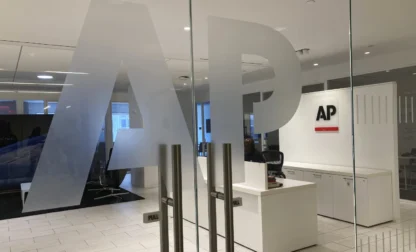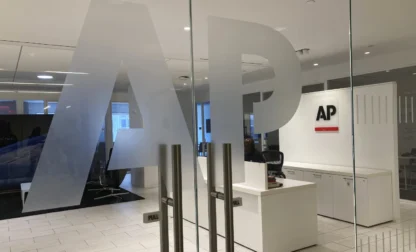WASHINGTON (AP) — The Justice Department on Wednesday announced revised guidelines for obtaining records from the news media during leak investigations, removing language that news organizations said was ambiguous and requiring additional levels of review before a journalist can be subpoenaed.
The updated policy revises protocols announced last year amid outrage among news organizations over Obama administration tactics. It was released two days after the Justice Department formally abandoned its yearslong efforts to compel a New York Times reporter to testify in the trial of a former CIA officer accused of disclosing classified information.
“These revised guidelines strike an appropriate balance between law enforcement’s need to protect the American people and the news media’s role in ensuring the free flow of information,” Attorney General Eric Holder said in announcing the new procedures.
The Justice Department had begun reviewing its own guidelines in 2013 and last February issued new rules designed to give news organizations an opportunity to challenge subpoenas or search warrants in federal court. But news organizations expressed concern that the protections applied only to journalists involved in “ordinary newsgathering activities” language they said was vague and could be exploited by zealous prosecutors.
That provision has been deleted in the new guidelines, which also require the attorney general to authorize subpoenas issued to members of the news media and for the Justice Department’s criminal division to also be consulted.
“We are very pleased the Justice Department took our concerns seriously and implemented changes that will strengthen the protection of journalists for years to come, with the public being the ultimate beneficiary,” said AP President and CEO Gary Pruitt.
AP General Counsel Karen Kaiser praised the changes for eliminating “potential ambiguity of what constitutes newsgathering and help provide consistency in how the guidelines are interpreted across investigations and administrations.”
The Obama administration has been criticized for bringing more leak cases than all predecessors combined, with media organizations particularly critical of maneuvers they said were intrusive and needlessly aggressive. Under Holder, the department secretly subpoenaed telephone records from Associated Press reporters and editors during an investigation into a 2012 story about a foiled terror plot, and labeled a Fox News journalist as a “co-conspirator” and used a search warrant to obtain emails from him.
But in the last year, the twilight of Holder’s six-year tenure as attorney general, the department has shown signs of modulating its approach in national security leak investigations. Holder has publicly expressed regret for the actions in the Fox News case and said several times that no journalist would go to jail under his watch for doing his or her job.
Last month, the Justice Department said it would stop trying to force New York Times reporter James Risen to reveal his source in the trial of ex-CIA officer Jeffrey Sterling, which opened this week in Virginia. On Monday, prosecutors formally announced that they were abandoning all efforts to seek his testimony after Risen, in an unusual pretrial hearing, made it clear that he had no interest in helping their case.
“What they would lose in public perception would far outweigh what they would gain by forcing him to do something he’s already made clear he wasn’t going to do,” said Jane Kirtley, a University of Minnesota professor of media ethics and law.
Lucy Dalglish, dean of the Philip Merrill College of Journalism at the University of Maryland, said any shift in Justice Department practice should not be mistaken as a newfound sign of benevolence for the news media. Instead, federal prosecutors are aware that a subpoena to a journalist inevitably causes prolonged court fights and a public-relations bruising, and so have looked for other ways to build criminal cases against leakers.
“It’s time-consuming, it’s expensive, it takes your attention away from what you’re trying to accomplish,” she said. “And I believe that, in recent years, they have become more confident that they can handle these cases without cooperation from journalists,” she said.
But, she noted, “If they didn’t think they had the tools to pull off these investigations, they wouldn’t be giving the media a break.”
___
Follow Eric Tucker on Twitter at http://www.twitter.com/etuckerAP



